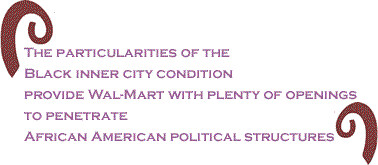The Living Wage Bill and the 2014 DC elections
It's been reported locally and nationally--especially in the business press---that Mayor Gray vetoed the Large Retailer Accountability Act legislation. The major provision in the bill was to impose a "minimum wage (including benefits) of $12.50 per hour on stores that have at least $1 billion of sales in the US, and are 75,000 s.f. or larger.
This was seen as a bill specifically directed at Walmart, because the bill has an exclusion for unionized employees, which would end up exempting chain supermarkets like Safeway or Giant.
I wasn't in favor of the bill, not because I think that retailers should be able to pay their employees poorly, but because I think that DC needs to have a much better set of regulations in place for the land use review of big box store projects, to ensure that the projects are well integrated into the urban fabric and to mitigate possible negative effects. See "Lessons from Walmart's foray," "Walmart: in the city, vs. of the city" and "DC's proposed legislation on large retailers is misguided."
But that wasn't the bill that the Council passed.
I probably am in support of the bill, as a recognition that minimum wages should be higher, and that with the hollowing out of the middle ground in available jobs, "Walmart" or "McDonald's" jobs (fast food workers have been "striking"--they don't have unions--for better pay over the summer, see "Fast-food workers strike for higher pay" from USA Today) are no longer entry jobs, a rung in the ladder of "moving on up" job-wise, they are permanent, especially for less well educated employees.
Just as cities and corporations are going bankrupt because of material changes in how local economies work as a result of the US being connected within a global economy, the world of work is in the process of changing as well.
Living Wage bills are on the agenda of more and more cities. It's an issue in the Seattle election right now as well ("Seattle mayor wants to block Whole Foods because of its low wages" from Grist Magazine and "Can city stop Whole Foods over pay? Lawyers differ" from KOMO News) and it's even on the ballot in the Puget Sound community of SeaTac ("Appeals court says SeaTac voters can decide on $15 minimum wage" from the Seattle Times).
When travelling abroad, compared to the US, I am always struck by how much more expensive food costs in supermarkets and at restaurants.
It's because employees are paid a living wage (+ taxes are higher on businesses, which pays for national health programs). In the US, our low food prices come at the expense of labor.
Going forward that may be changing.
The impact on the DC elections. Mayor Gray will make the case that he vetoed the bill to prevent Walmart from leaving the city, and two of the stores that they propose to build are in lesser served areas of the city (plans for a sixth store fell through more recently, see "For what it's worth"), and they will be large employers.
 Call out quote from the Black Commentator article "Cover Story: A 'Movement' Against Wal-Mart."
Call out quote from the Black Commentator article "Cover Story: A 'Movement' Against Wal-Mart."I have written before that Walmart, typically, treats employees pretty badly ("Piling on City Council") and so it is an issue of "is any job better than nothing?"
As a city, as a community, we should be concerned about the businesses we attract and actively recruit to the city and in turn, the kind of environment and opportunities that these businesses provide to their employees.
Regardless, I think this will be a big election issue in the Mayoral campaign. I think Gray's veto means that he has already decided that he won't run for re-election.
But, I could be wrong. Maybe he will run again. But it's going to be hard for him to not be implicated in election fraud around his successful primary win in 2010. So maybe that is an influence too.
And he thinks that Walmart is the right choice to define his Mayoralty, for his legacy.
Labels: big box retail ordinances, elections and campaigns, electoral politics and influence, formula retail, legislative process, real estate development, unions and labor, wage regulations/minimum wage



0 Comments:
Post a Comment
<< Home